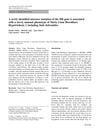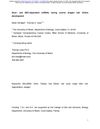2 citations,
May 2022 in “International Journal of Impotence Research” Finasteride may be linked to Peyronie’s disease, but more research is needed.
16 citations,
January 2019 in “Pharmaceutical biology” Lespedeza cuneata extract may help treat enlarged prostate.
[object Object]  May 2023 in “Journal of Investigative Dermatology”
May 2023 in “Journal of Investigative Dermatology” Blocking DPP4 can potentially speed up hair growth and regeneration, especially after injury or in cases of hair loss.
 43 citations,
January 2016 in “International Journal of Andrology”
43 citations,
January 2016 in “International Journal of Andrology” Finasteride caused long-term sexual and non-sexual side effects in young men with hair loss.
 36 citations,
February 2017 in “BMC Complementary and Alternative Medicine”
36 citations,
February 2017 in “BMC Complementary and Alternative Medicine” Geranium sibiricum extract helps hair grow and is more effective than minoxidil but can be toxic in high concentrations.
 1 citations,
December 2022 in “bioRxiv (Cold Spring Harbor Laboratory)”
1 citations,
December 2022 in “bioRxiv (Cold Spring Harbor Laboratory)” Pangolins have lost some skin-related genes, but kept others, showing complex skin evolution.
 September 2021 in “Research Square (Research Square)”
September 2021 in “Research Square (Research Square)” Not having enough or having too much of the protein Grainyhead-like 3 leads to various developmental problems.
 11 citations,
April 2019 in “Bioscience Reports”
11 citations,
April 2019 in “Bioscience Reports” Certain genetic variations in the RAB5B gene are linked to a higher risk of polycystic ovary syndrome in Chinese Han women.
 58 citations,
January 2006 in “Skin Pharmacology and Physiology”
58 citations,
January 2006 in “Skin Pharmacology and Physiology” High levels of testosterone and 5α-DHT can lead to cell death in cells important for hair growth.
 3 citations,
July 2021 in “Life science alliance”
3 citations,
July 2021 in “Life science alliance” PNKP is essential for keeping adult mouse progenitor cells healthy and growing normally.
 8 citations,
July 2011 in “Animal science journal”
8 citations,
July 2011 in “Animal science journal” Keratin 33A is a key protein in goat winter coats, especially in high-producing breeds.
 4 citations,
December 2022 in “Advanced science”
4 citations,
December 2022 in “Advanced science” SCD1 is important for hair growth by keeping the connection in skin cells where hair stem cells live stable.
 6 citations,
May 2012 in “Archives of Dermatological Research”
6 citations,
May 2012 in “Archives of Dermatological Research” A new mutation in the HR gene is linked to a rare form of hair loss with limb deformities.
 2 citations,
November 2022 in “Animal Bioscience”
2 citations,
November 2022 in “Animal Bioscience” A specific RNA modification in cashmere goats helps activate hair growth-related stem cells.
 5 citations,
September 2020 in “Molecules”
5 citations,
September 2020 in “Molecules” Extracts from three Polynesian plants were found to promote hair growth by affecting cell growth and gene expression related to hair.
 8 citations,
April 2009 in “International journal of oncology”
8 citations,
April 2009 in “International journal of oncology” Hair follicle cells resist turning into skin cells.
 45 citations,
August 2010 in “Hormone Molecular Biology and Clinical Investigation”
45 citations,
August 2010 in “Hormone Molecular Biology and Clinical Investigation” Type 3 5α-reductase is more common and finasteride and dutasteride strongly inhibit it.
31 citations,
November 2015 in “PloS one” Reducing Tyrosinase prevents mature color pigment cells from forming in mouse hair.
 14 citations,
February 2018 in “Psychoneuroendocrinology”
14 citations,
February 2018 in “Psychoneuroendocrinology” Mice lacking steroid 5α-reductase 2 show less aggression and better impulse control.
 10 citations,
November 2015 in “Plant Foods for Human Nutrition”
10 citations,
November 2015 in “Plant Foods for Human Nutrition” Hibiscus petals helped control blood sugar and improve liver and pancreas health in diabetic rats.
[object Object]  3 citations,
February 2021 in “bioRxiv (Cold Spring Harbor Laboratory)”
3 citations,
February 2021 in “bioRxiv (Cold Spring Harbor Laboratory)” Adult esophageal cells can start to become like skin cells, with a key pathway influencing this change.
 November 2023 in “bioRxiv (Cold Spring Harbor Laboratory)”
November 2023 in “bioRxiv (Cold Spring Harbor Laboratory)” Scientists made a mouse that shows how a specific protein in the skin changes and affects hair growth and shape.
 1 citations,
November 2018 in “bioRxiv (Cold Spring Harbor Laboratory)”
1 citations,
November 2018 in “bioRxiv (Cold Spring Harbor Laboratory)” Signals from skin cells controlled by Rac proteins help turn certain precursor cells into white fat cells.
 1 citations,
January 2020 in “bioRxiv (Cold Spring Harbor Laboratory)”
1 citations,
January 2020 in “bioRxiv (Cold Spring Harbor Laboratory)” Dicer is crucial for hair growth in mice.
 26 citations,
July 2016 in “PLOS ONE”
26 citations,
July 2016 in “PLOS ONE” Activating β-catenin in certain skin cells speeds up hair growth in mice.
 15 citations,
January 2016 in “Biological & Pharmaceutical Bulletin”
15 citations,
January 2016 in “Biological & Pharmaceutical Bulletin” Bee venom helps hair grow and may work better than some common treatments.
 76 citations,
September 1992 in “Endocrinology”
76 citations,
September 1992 in “Endocrinology” The human type II 5α-reductase gene has a specific structure important for understanding certain medical conditions.
 January 2024 in “Regenerative Biomaterials”
January 2024 in “Regenerative Biomaterials” Metal organic frameworks-based scaffolds show promise for tissue repair due to their unique properties.
























